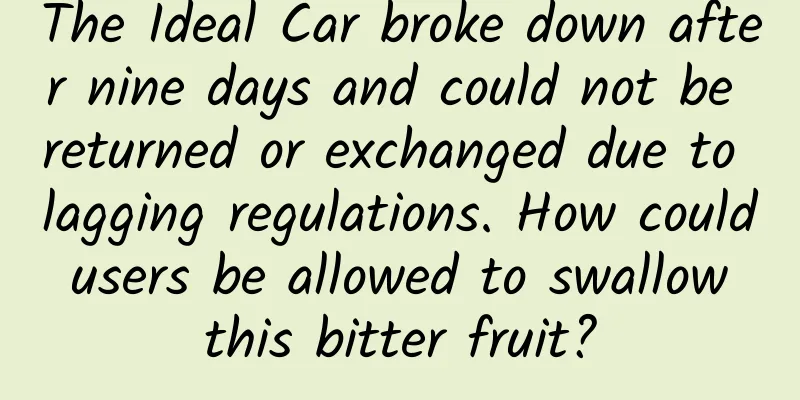The Ideal Car broke down after nine days and could not be returned or exchanged due to lagging regulations. How could users be allowed to swallow this bitter fruit?

|
On July 7, the 1818 Golden Eye program reported that a consumer in Hangzhou bought an Ideal L6 with a landing price of 260,000 yuan, and problems arose nine days after the car was picked up. After inspection, the Ideal official said that the motor needed to be replaced. The owner felt uncomfortable and asked for a refund or exchange, but was rejected by the Ideal official. It is natural for the car owner to ask for a refund or replacement. It is hard for anyone to accept that the motor of a 260,000 yuan car needs to be replaced after only nine days of use. So why can Ideal Auto refuse to refund or exchange the car with confidence? The reason is very direct: the owner's situation does not meet the Zhejiang Province's "Three Guarantees" refund and exchange regulations. Zhejiang Province’s “Three Guarantees Regulations” are mainly derived from two legal provisions.
However, this regulation was promulgated on May 1, 2017. At that time, new energy vehicles had not yet emerged, and the relevant regulations only applied to fuel vehicles, which do not have motors. Therefore, "replacing the motor" is not included in the three guarantees regulations. 2. Article 20 of the "Regulations on the Responsibility for Repair, Replacement and Return of Household Automobile Products" which will come into effect on January 1, 2022, stipulates that if a household automobile has quality problems with the main components of the engine, transmission, battery, and drive motor, consumers can choose to replace them. This regulation covers new energy vehicles, but it should be noted that if there is a problem with the motor, the only option is to replace the motor, rather than "returning the entire vehicle." In other words, the owner's request to return the entire vehicle due to problems with the motor is "illegally unfounded" at this stage, which is also the main reason why Ideal officials take a tough attitude. The incident itself is not complicated, and there is nothing wrong with the car owner's demands and ideals. But this incident reveals two key issues: first, Zhejiang Province's laws and regulations on new energy vehicles are not sound; second, some new energy manufacturers do not know how to show "extra-legal leniency" to consumers in the absence of laws to rely on. The "Three Guarantees" regulations issued and implemented on May 1, 2017 did not involve "motors", a special component for new energy vehicles. However, in fact, the sales volume of new energy vehicles in China reached 777,000 in 2017, a year-on-year increase of 53.3%. However, this regulation still ignores new energy vehicles and only regulates fuel vehicles. The regulations that will be implemented on January 1, 2022 clearly stipulate that when there is a problem with the motor, it can only be replaced and the whole vehicle cannot be returned. This is actually also lagging. If a fuel vehicle has a major failure such as the engine during the three-guarantee period, it can be returned or replaced. However, when it comes to electric vehicles, the regulations cannot be extended and applied equally. In the era of fuel vehicles, it is not uncommon for manufacturers to refund or replace vehicles due to quality issues. In 2019, the "Mercedes-Benz oil leakage incident" in which a female owner of a Mercedes-Benz 4S store in Xi'an climbed onto the roof of her car to defend her rights was one of them. In the end, Mercedes-Benz officially provided the owner with a brand new Mercedes-Benz car. In the new energy vehicle industry, such things are still very rare. For example, Ideal Auto’s tough attitude in the first place pushed the topic to the hot search, which shows that although new car-making forces such as Ideal Auto regard traffic as their core competitiveness, they still lack some sincere and necessary response measures on some specific issues involving interests. The motor broke down for nine days. Is this a serious problem? Of course it is serious, but how serious is it? It doesn't seem that exaggerated. Ideal Auto's sales in 2023 will reach 376,000 units, and nearly 80,000 units have been sold in the last two months. There have been no large-scale quality problems. The motor broke down in 9 days, which should be an isolated case. Just like Tango, the head of Ideal Auto's product line, said: Even rockets can fail to launch, so what industrial products can be said to be 100% fault-free? Why does every company have an after-sales department? Isn't it because all industrial products have a failure rate? The words are very convincing, and although they may be crude, the logic is sound. But as the saying goes, the dust of XX falling on a person's head is like a mountain. Now the dust of Ideal happened to fall on the head of this customer. The customer felt it was too bad, and Ideal comforted it with a stern face, saying that there was no law to rely on at present, and industrial products had the probability of failure. Ideal's approach is absolutely legal, but it seems a bit ruthless. In fact, judging from the data, Ideal's motor failure rate is not high, and few users encounter this situation. In addition to the normal three guarantees, what is the big deal in meeting users' demand for return and exchange of vehicles? After all, Ideal is still reluctant to spend the money to warm the hearts of users. Now Ideal Auto is arguing over the issue of car returns and exchanges, and has pushed itself to the top of the hot searches by using the lagging three guarantees regulations as an excuse, which is actually not worth the loss. The cost of suppressing this trending search is estimated to be at least ten times that of replacing a customer’s car. Ideal Auto still hasn’t figured out one thing: the so-called “overwhelming traffic” is always a double-edged sword. What impact will this Ideal L6 incident have on potential consumers? Will consumers carefully check the three guarantees regulations? Will they stand with the manufacturers? Of course not. Consumers are naturally on the same front. They don’t have the energy or ability to read the regulations, but they hope that when their cars have the same problems, they can also enjoy the return and exchange service. Imagine what will happen if this matter continues to be deadlocked? Everyone has since remembered that "Lixiang Auto's motor broke down after nine days". Even if Ideal Auto announces a refund or replacement for car owners in the future, consumers will think that "Lixiang Auto was forced to do so due to pressure from public opinion". This is the true nature of network traffic. It can lift a brand to the sky, but it can also complicate a simple problem and cause everyone to beat it. We don't know how this incident will end, but both Ideal Auto and the entire new energy vehicle industry seem to be in urgent need of making up for their shortcomings. Laws and regulations must be improved at the same time, and manufacturers must take consumers' demands seriously. Only in this way can we enter a true new energy era. In June 2024, the domestic penetration rate of new energy vehicles has exceeded 50%. We can no longer allow our consumers to lack laws to rely on and become the "helpless and silent majority." A speck of dust floating by in the era of new energy vehicles is just a speck of dust. It cannot and should not become a mountain hanging over the heads of consumers. As a winner of Toutiao's Qingyun Plan and Baijiahao's Bai+ Plan, the 2019 Baidu Digital Author of the Year, the Baijiahao's Most Popular Author in the Technology Field, the 2019 Sogou Technology and Culture Author, and the 2021 Baijiahao Quarterly Influential Creator, he has won many awards, including the 2013 Sohu Best Industry Media Person, the 2015 China New Media Entrepreneurship Competition Beijing Third Place, the 2015 Guangmang Experience Award, the 2015 China New Media Entrepreneurship Competition Finals Third Place, and the 2018 Baidu Dynamic Annual Powerful Celebrity. |
<<: Is the new iPod touch, which has similar configuration to iPhone 6, worth buying?
>>: 1/2.4 inch phase focus depth analysis Sony IMX230
Recommend
Users are choosing smart TVs, and the spring is coming
At present, intelligence has become a must-have f...
How does information flow advertising accurately target users?
In this article, we will learn about people with ...
Google executives express willingness to return to the Chinese market
According to foreign media reports, Google Senior...
How to promote user sharing and dissemination?
For internet dogs, it is easy to organize an even...
How did the last population of mammoths disappear from the earth?
As a species that "just" became extinct...
How to operate and promote APP? Familiarize yourself with these 4 points first!
The four most important points in APP operation a...
With the "woolly mammoth rat", can we really "revive the mammoth"?
On March 4, the US biotechnology company Colossal...
How to use coupons? A brief analysis of how to play the activity!
Coupons are rarely missed in any activities among...
Electric Technology Auto News: Great Wall Motors has repeatedly come up with surprising moves in the fiercely competitive compact SUV market. Can the VV5, which is positioned higher than Haval, successfully break through?
The progress of Chinese brands in recent years is...
Review! Alipay's promotional tactics of sending 1 billion red envelopes
After the amazing copywriting of Alipay red envel...
The 2016 first half of the year App Comprehensive Strength Ranking (the most beautiful on the entire network) Are you on the list today?
I examine myself three times a day: Have you comp...
Are the DIY whitening water and slimming water that are said to be effective in one week really that magical? Drinking water this way is healthier →
gossip Becoming whiter, thinner, and more beautif...
The practical method of increasing 3 million followers on Douyin in 3 months
I have been working on TikTok for more than a yea...
Kuaishou Operation: Inventory of techniques to increase followers!
How to operate Kuaishou and increase followers qu...
New vulnerability turns Android phones into trees?
Trend Micro reported a vulnerability that was mar...









